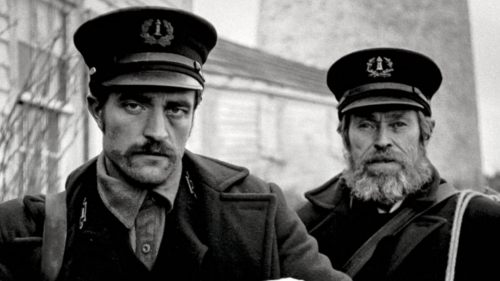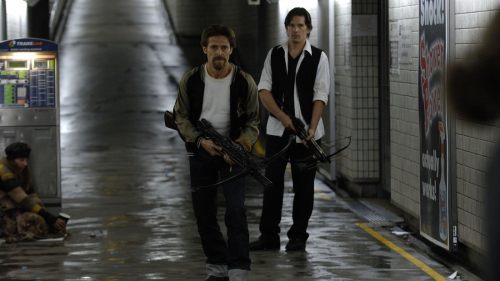ANTICHRIST And The Destructive Nature Of Man
There is nothing typical about grief, which cannot be defined or contained or reduced down to petty language. Just as all women cannot be defined or contained or reduced down to banal words and phrases. Lars von Trier's Antichrist and Charlotte Gainsbourg challenge this reductive thinking, which has been normalized to such a degree that we hardly consider its implications. Antichrist is not a film about the inherent evil of women, nor is it merely a sick exploration of grief and despair. Von Trier's film agitates with intent, presenting an exceedingly complex network of ideas, as tangled and gnarled as the oak trees surrounding Eden.
The deer in the woods with its stillborn young still hanging from its womb is the perfect, sickening metaphor for Gainsbourg's She, who torturously carries and nurtures her grief as a comfort and a hindrance (like a child) - that image is as repulsive as it is strikingly beautiful, the pristine embodiment of a relationship that is at once both symbiotic and antagonistic. What place does nature vs. nurture have in Eden, where She declares nature as Satan's church?
Von Trier presents She's sexual desires as ravenous, animalistic, insidious and desperate - the cravings of the grief-stricken mother, whose anguish cannot be soothed but only distracted by momentary pleasure. Her attempts to have sex with her husband are seemingly abrupt and forceful, and yet He resigns himself to his innate desires and basic instincts, all the while attempting to control that which cannot be controlled - to essentially dominate his wife (and through her, nature both as tangible and intangible concepts), although he doesn't see or understand it that way.
His endeavors to help his wife are based mostly in classic Jungian teachings of psychoanalysis, where the woods She walks through and the body of water She passes over are symbolic of both her fears and desires, intangible elements made tangible through guided mental exercises. Nature itself, to her, represents both women and evil. She says, "Women do not control their own bodies. Nature does." We typically perceive women as an extension of nature, but nature is duplicitous, and for all the life it gives, it also harbors much death.
She immerses herself in Eden to research her thesis on the persecution of women, women who have been tortured and murdered by men for centuries, men who refused to understand or accept the complexity of their gender opposites. This hatred of women is and was born of fear - and to fear women is to fear nature itself; to reject women is to reject nature. It's not She who is truly terrified of nature, but He, and much of Antichrist stands as an abject lesson not in the evil of women, but the evil of men, and our innate and all-too-typical perceptions of gender, which von Trier gleefully distorts.
Masturbation is a recurring theme throughout, and it's with this almost violent self-pleasure that She takes agency, seeking solace in her body while rejecting its very nature. He tells her that immersion therapy works best, that She must be fully exposed to her fears in order to get well. She does not fear tangible nature, but the intangible nature of herself - her desires and instincts, her complex and relentless craving for sexual gratification; the same gratification that cost her a child. Masturbation becomes therapeutic, as She exposes herself to the sinister pleasure that took precedence over the life of someone smaller and weaker.
Perhaps She knows what He does not: an intuitive and well-researched understanding of man's inability to tolerate or accept the profound complications of a woman's psyche, her complex relationship with nature and her self. Which is why she fears his abandonment and rejection, and that fear presents itself as outrage. The climactic act finds Gainsbourg mutilating Willem Dafoe's leg, gruesomely attaching a weight to it so that he cannot leave. It's an act which doesn't immediately read as sexual, but is symbolically so. She effectively molests her husband, masturbating his penis until he ejaculates blood. Pain supplants pleasure, and She robs him of a pitiful male concept of power - that idea that men are equally capable of supplying life. But there would be no He without She; no life without her.
She drills into his leg, sticking her finger inside and curiously examining the gruesome wetness there before attaching a weight to his leg so that he cannot leave while symbolically penetrating this appendage.
Her ultimate act of self-rejection arrives when she brutally castrates herself, removing her clitoris with a pair of scissors, a typically feminine instrument. Her husband's ultimate act of female-rejection and aggression arrives, however, when he slowly strangles her to death, effectively throttling her perceived evil and giving her everything that she wants: release, acknowledged resentment and the paramount expression of misogynistic fear, rejection and hatred.
The key to understanding Antichrist's gender interplay comes in the final shot: the freed husband, roughing it on a hike to liberation, encounters the three beggars (pain, grief, despair), signifying the arrival of the thousands (or perhaps even millions) of faceless, nameless women persecuted, snuffed out and destroyed by men throughout the centuries, emblematically descending upon him. He will be consumed. Nature runs its course.
Antichrist is not about what is or isn't in a woman's nature, but about the nature of man: his innate desire to seek out and destroy that which he fears most. Man fears that which he refuses to understand.



